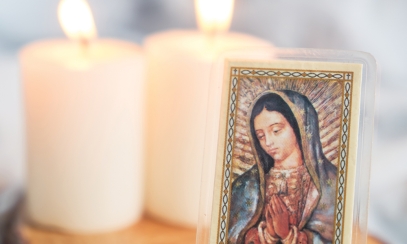
Your Lenten Weather Report
Those who study weather use a device that measures the speed and direction of wind – an anemometer. Saints such as St. Ignatius of Loyola recommend we do something similar in the spiritual life, encouraging us to monitor the “winds” that blow within us. These winds can be judgmental or unloving thoughts that well up within us, other obvious temptations to sin or just subtle movements of the spirit that are sometimes hard to understand. Our challenge is to stay vigilant and, with God’s help, prayerfully discern which interior movements are truly from the Lord and which ones are not.
Those who study weather use a device that measures the speed and direction of wind – an anemometer. Saints such as St. Ignatius of Loyola recommend we do something similar in the spiritual life, encouraging us to monitor the “winds” that blow within us. These winds can be judgmental or unloving thoughts that well up within us, other obvious temptations to sin or just subtle movements of the spirit that are sometimes hard to understand. Our challenge is to stay vigilant and, with God’s help, prayerfully discern which interior movements are truly from the Lord and which ones are not.
Lent is a perfect time for this spiritual practice of “discerning the winds within” – especially if we have not already made this a daily habit. Here is a list of some interior movements that are important to be aware of, along with some helpful ways to respond.
“Mirror, mirror on the wall…”
It is often mysterious why a certain individual just rubs us the wrong way. One question to reflect on is whether this person annoys me precisely because he or she mirrors qualities that I do not like in myself. We can ask Jesus to illuminate whether this is the truth, and then ask his help to overcome our own shortcomings.
Novelty
As a newly-ordained priest was starting to greet people after the ordination Mass, an elderly man leaned over and whispered: “Remember, Father – novelty is the seductress of every priest.” The same temptation also impacts laypeople. All of us can feel attracted to something simply because it is new. For example, a Catholic I've known for decades recently became intrigued by New Age spirituality. It seemed so interesting compared to the Catholic prayers and devotions he was familiar with. He started dabbling in Eastern religious practices like reiki and eventually shamanism. Tragically, this led him into a personal crisis from which he is still recovering. (Please say a prayer for him.)
Becoming what we react against
The poet and artist, William Blake, was initially enthusiastic about the French Revolution when it began in 1789. Then he noticed something that concerned him. He saw that the revolutionaries were starting to exhibit the same authoritarianism and brutality which they had accused the monarchy of – and which they were claiming to overthrow. In his poetry and art, Blake symbolized this dynamic by using two mythological figures: Orc (a fiery creature representing the revolutionary spirit of youth) and Urizen (a grey-bearded, unbending authority figure representing the status quo whose name is a pun on “your reason”). Blake saw that, barring an intervention by the grace of Christ, the rebelling Orc inevitably becomes Urizen and is doomed to take on the negative qualities which he originally set out to rebel against. In monitoring our interior movements, it is helpful to watch out for this dynamic in our own lives. For example, in my reaction to Aunt Betty, who is always hypercritical of others, am I myself becoming hypercritical? Or – in getting fed up with a Christian friend that we view as “too rigid” in the practice of her or his faith – am I becoming too rigid in my own reactions?
Playing God
“Kevin acted this way towards me because he…” This judgment statement usually ends with us presuming to know the intentions behind why Kevin acted the way he did. Yet God is the only one who can fully know a person’s intentions. One way to counteract our tendency to judge another person’s intentions is to use a phrase recommended by the psychiatrist, Dr. Abraham Low: “This person did something that annoyed me; he or she didn’t do something to annoy me.” It is also good to remember that people who hurt us are often acting out of their own woundedness. “Hurt people hurt people,” as the saying goes.
Counterfeit Gemütlichkeit
“Did you hear about the scandalous behavior of so-and-so?” “Can you believe what those ________ are up to now? They are destroying the Church!” (Fill in the blank with words like “progressives” or “traditionalists.”) What is the bait that leads us into gossiping about or unjustly accusing another individual or group of people? The great French Catholic philosopher, Rene Girard, studied the scapegoating dynamic in human history, and he names the bait. The main reason we join others in gossiping or scapegoating is because doing so provides a feeling of fellowship – a fleeting, false sense of unity that the Germans call, gemütlichkeit.
For example, two women meeting over coffee experience a bond of pseudo-closeness as they join in criticizing their friend’s fashion choices. Flash forward to Sunday. As three parishioners enjoy some glazed donuts after Mass, they feel a rush of counterfeit solidarity when they complain about a group of fellow parishioners whom they accuse of intentionally “ruining the parish.” Once we know the bait of gemütlichkeit, we can recognize the trap and excuse ourselves from the next round of gossip or the next scapegoating session. The spirit of Christ is to excuse, not accuse, as we see in his words from the Cross: “Father, forgive them, they know not what they do” (Lk 23:34).
Sponge drops and the Holy Spirit
St. Ignatius of Loyola offers us many helpful tips on the spiritual life. In his famous retreat, the Spiritual Exercises, he states that – for Christians in a state of grace striving to grow closer to God – the actions of the good Spirit within us tend to be gentle…like drops of water falling on a sponge. By contrast, the actions of the enemy’s spirit tend to be clashing and violent, leaving us disturbed, discouraged and confused. Knowing this principle helps us discern more wisely.
Temptations against charity or chastity
If Jesus suffered temptations in the desert, it is no surprise that we are tempted too. For instance, has it ever happened to you that while walking down the aisle to receive Holy Communion, a disturbing thought or image seems to come out of nowhere? It could be an unloving thought about someone or it could be a mental image that challenges our purity of heart. Temptations can occur anytime, of course, but some Catholics do experience such ill winds as they are in line for Holy Communion or as they begin a time of prayer.
There is an old adage that “flies don’t gather around plastic fruit.” In other words, it should be no surprise that the enemy of our souls wants to take away our peace and even our state of grace precisely at our most intimate times of communion with the Lord. Such spiritual assaults can also occur as a person prepares to die. What should we do in these moments of fierce temptation? Years ago, a monk at the Abbey of the Genesee gave this advice during a retreat: Whenever we are tempted, just pray, “Lord, I love you more than this; help me love you more.” When the enemy sees that we are using each temptation as an opportunity to grow in the love of God, it will infuriate him. He will soon cease his attacks and we will find peace.
Dr. Dan Osborn is the Diocesan Theologian and Coordinator of Permanent Diaconate Formation & Ministry for the Diocese of Saginaw.



